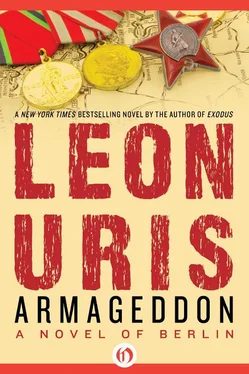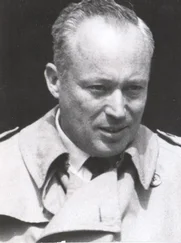Armageddon - Leon Uris
Здесь есть возможность читать онлайн «Armageddon - Leon Uris» весь текст электронной книги совершенно бесплатно (целиком полную версию без сокращений). В некоторых случаях можно слушать аудио, скачать через торрент в формате fb2 и присутствует краткое содержание. Жанр: Старинная литература, на английском языке. Описание произведения, (предисловие) а так же отзывы посетителей доступны на портале библиотеки ЛибКат.
- Название:Leon Uris
- Автор:
- Жанр:
- Год:неизвестен
- ISBN:нет данных
- Рейтинг книги:4 / 5. Голосов: 1
-
Избранное:Добавить в избранное
- Отзывы:
-
Ваша оценка:
- 80
- 1
- 2
- 3
- 4
- 5
Leon Uris: краткое содержание, описание и аннотация
Предлагаем к чтению аннотацию, описание, краткое содержание или предисловие (зависит от того, что написал сам автор книги «Leon Uris»). Если вы не нашли необходимую информацию о книге — напишите в комментариях, мы постараемся отыскать её.
Leon Uris — читать онлайн бесплатно полную книгу (весь текст) целиком
Ниже представлен текст книги, разбитый по страницам. Система сохранения места последней прочитанной страницы, позволяет с удобством читать онлайн бесплатно книгу «Leon Uris», без необходимости каждый раз заново искать на чём Вы остановились. Поставьте закладку, и сможете в любой момент перейти на страницу, на которой закончили чтение.
Интервал:
Закладка:
Since World War II the Machine Works as well as the smaller factories have been converted to making war material. The area has been heavily bombed in recent months.
Sean’s doubts deepened as he dug more deeply into the tormented history of civil and religious wars, of blood orgies, of paganism and tribalism. Of the pride of barons and princes. Of a story of double dealings, alliances, back stabbings too complex to follow. Of the homosexuality and perversion of the Nazis. Of a deep-set brutality never known by man before. Of Hinterseer, the mystic poet. Of the mystic philosophers. Of singers and musicians and writers and men of science. Intellectuals and barbarians. Brutes and scholars. Love and murder.
Sean O’Sullivan wondered, as General Hansen wondered, if any manner of man could bring sanity to a land that had never known it. What power, earthly or otherwise, could make the wonderment of an idea find its way through this lacework of muck and beauty?
Chapter Ten
FOR THE NEXT MONTH Sean and Dante Arosa plunged into the records and backgrounds of nearly four thousand officers at the Military Government Training Center at the Hore-Belisha Barracks at Shrivenham. They weeded, weighed and then were ready to select the Pilot Team.
Dante Arosa returned to Queen Mother’s Gate to assemble all the intelligence data on Rombaden while Sean stayed at Shrivenham to conduct the interviews for candidates.
Lieutenant Shenandoah Blessing entered Sean’s office. He was an immense man who walked with the peculiar gracefulness that some fat people develop from constantly fighting for their balance. In the first handshake, Sean detected both the deceptive quickness and the power of the man.
“You were sheriff of Hook County, Tennessee, for nine years?”
A voice filled with folksy sweetness emerged from Blessing’s moon face. He answered in the affirmative.
“And you went through a dozen special courses at F.B.L training schools ...”
Blessing modestly admitted to his credentials. There were a few more formal questions, but Sean had known all along that Blessing would be his man. Hook County was similar in size and population to Rombaden/Romstein. Hook County was rough territory with difficult police problems. Despite Blessing’s guise at modesty he had a known reputation for progressive law enforcement and his record was filled with innumerable examples of personal courage and ingenuity.
“The police problem in Rombaden is going to be particularly difficult because we haven’t enough whitelisted Germans to direct traffic. It’s Nazi top to bottom.”
“How many boys am I going to be able to take in with me?”
“I think I can get you twenty.”
Twenty men to handle a hundred thousand enemy civilians plus unknown numbers of soldiers, fanatics, displaced persons. They would have to be hand-picked, trained like spartans, and damned near fearless as well as cagey as hell.
“Can I pick my own people?”
“Yes.”
“Well then, I reckon we’ll muddle through, Major.”
The oldest man Sean had tabbed was also chosen without a shade of doubt. Captain H. W. Trueblood was sixty-two years of age. His unique qualifications and determination to participate in the war had brought him to Shrivenham. Trueblood had been a curator for the National Gallery in London, specializing in the middle German periods. He spoke a fluent German and was totally immersed in German history.
Trueblood was pale as only an Englishman who never sees the sun can be pale. He spoke in hushed tones, never really addressing anyone in particular. The perfect scholar, Sean thought.
“Are you familiar with the Roman Kunsthalle in Rombaden?”
“Yes, of course.” And Trueblood quickly refreshed his memory aloud. “Extraordinary representation of the second German period ... Hans Pleydenwurff, Wolgemut. They must have several Van Soests and I know of four Grünewalds. Then, of course, their own Schwaben masters, Konrad Witz and Lucas Moser ...”
“Of course,” Sean said, fascinated by the “foreign” language he spoke.
Trueblood suddenly reminded himself there was a layman before him and tried to correct himself. “I speak of course of the fifteenth-century Cologne and Flemish schools.”
“Sure.”
“There is an excellent portion given to Renaissance Germans. The Von Romstein family has supported the museum heavily, you know.”
“Just how difficult is it going to be to get an accurate catalogue which will also include the cathedral and the Romstein Castle?”
“Well, one hardly knows where the paintings have been transported since the bombings, does one?” And as an afterthought mumbled, “Be a terrible pity if they lost their Moser altar ...”
Another Englishman, Dr. Geoffrey Grimwood, had retired from the army as an Officer of the British Empire. He had served in India as a hospital director in a place where famine and epidemic were academic. After army retirement he took a high post in the public health service. Like Trueblood, he did not want the war to pass him by.
Through his sandy walrus moustache Grimwood imparted to Sean that he spoke passable German and had attended seminars on public health at the Rombaden Medical College before the war.
There was another British officer, W. W. Tidings, from the German department of Barclay’s Bank, who was a wizard in that mystic realm of international currency.
There was a Canadian, Bertrand Collier, who had been a foreign correspondent in Germany, and later, news analyst for Canadian Broadcasting.
There were Americans: Dale Hickman, who was well known as an agricultural economist; Sam Alterman, a communications engineer with International Tel. and Tel.
There was Bill Bolinski, a thirty-two-year-old lawyer whose father was Polish and mother was German, and he spoke both languages well. In addition to legal officer he was made displaced persons officer.
There was Hank Greenberg, a civil engineer who was born in Germany and began his schooling at Humboldt University in Berlin and completed it at Carnegie Tech in Pittsburgh. City planning was his bailiwick. Commissioned into the Army in 1940, he had planned and constructed a half-dozen new army bases when A. J. Hansen snatched him away for Military Government.
But for the fact that he was Jewish, Greenberg had a complete Germanic appearance: thick dark brows, large brown eyes, tall limber build. He showed no reaction to Sean’s hammering questions.
“You were born in Mannheim?”
“Yes. During World War I, where my father was a good German soldier. In fact he holds an Iron Cross,” Greenberg answered with only the slightest trace of accent.
“Jewish, both sides?”
“Completely by birth, moderately by religion. As you can see on your record there, the Hank is really Heinrich.”
“Just what kind of personal persecution did you encounter from the Nazis?”
Greenberg smiled slightly. “My father was smart enough to get out of Germany before Hitler took power. However, it was never far enough back for a Jew in Germany. Anti-Semitism is not a later-day phenomenon. It has been going on for a thousand years, Major.”
“Then it must give you a vicarious thrill knowing Germany is being dismembered by the bombing raids.”
“The same vicarious thrill it gives you, Major. We are both Americans.”
“Do you have any pleasant recollections of Germany?”
“Of course. I spent my childhood there, became a young man there.”
“What language do your parents speak at home?”
“German.”
“What kind of punishment do you feel the Nazis should receive?”
“That is in your province. I am an engineer. I deal in mathematics.”
Sean liked Greenberg, liked his thick skin and deliberate attitude. Yet, there was something about Greenberg he could not put his finger on. Something about him that said there was still a lot of German in the man. Was this so strange? After all, nearly one fifth of the American population is of German ancestry and emigration. And what of his own father? Still Irish to the core of his soul. Despite Greenberg’s facade Sean believed there was a love-hate duel within him.
Читать дальшеИнтервал:
Закладка:
Похожие книги на «Leon Uris»
Представляем Вашему вниманию похожие книги на «Leon Uris» списком для выбора. Мы отобрали схожую по названию и смыслу литературу в надежде предоставить читателям больше вариантов отыскать новые, интересные, ещё непрочитанные произведения.
Обсуждение, отзывы о книге «Leon Uris» и просто собственные мнения читателей. Оставьте ваши комментарии, напишите, что Вы думаете о произведении, его смысле или главных героях. Укажите что конкретно понравилось, а что нет, и почему Вы так считаете.











